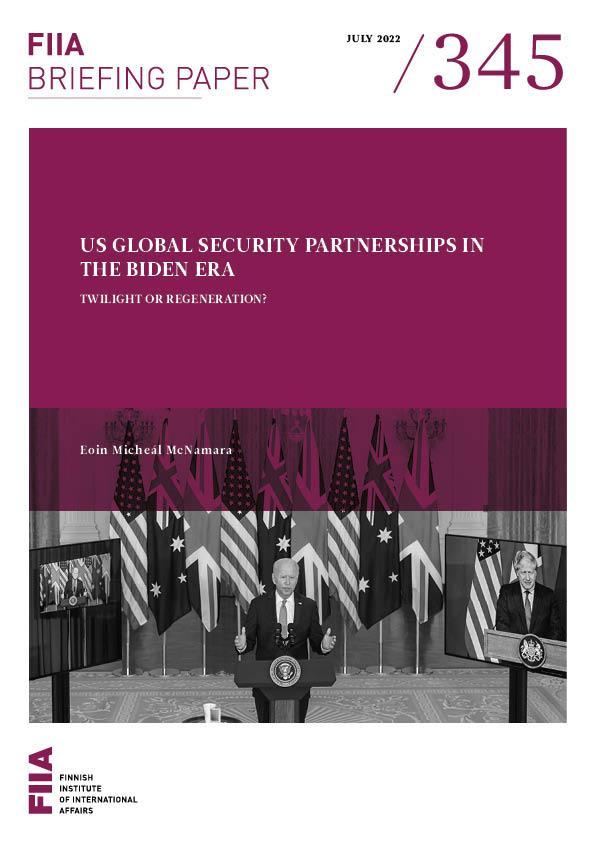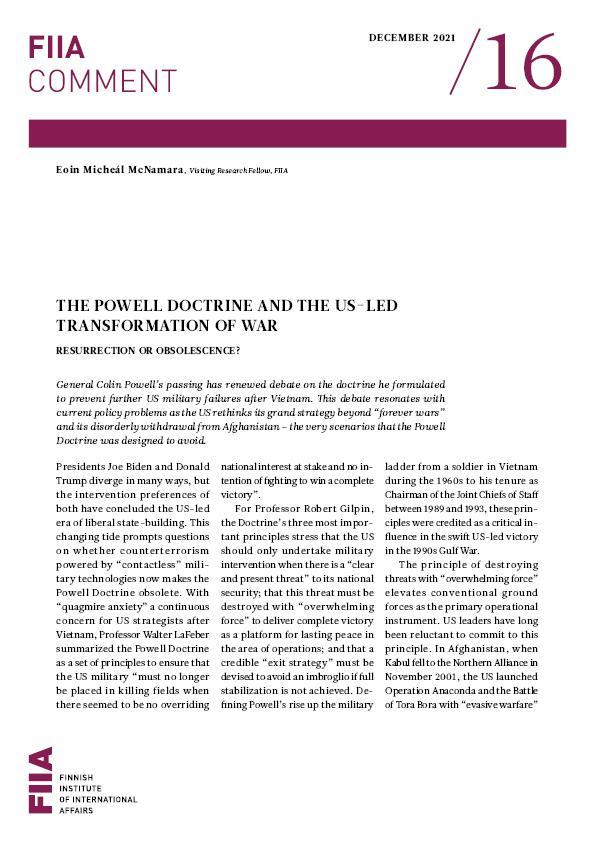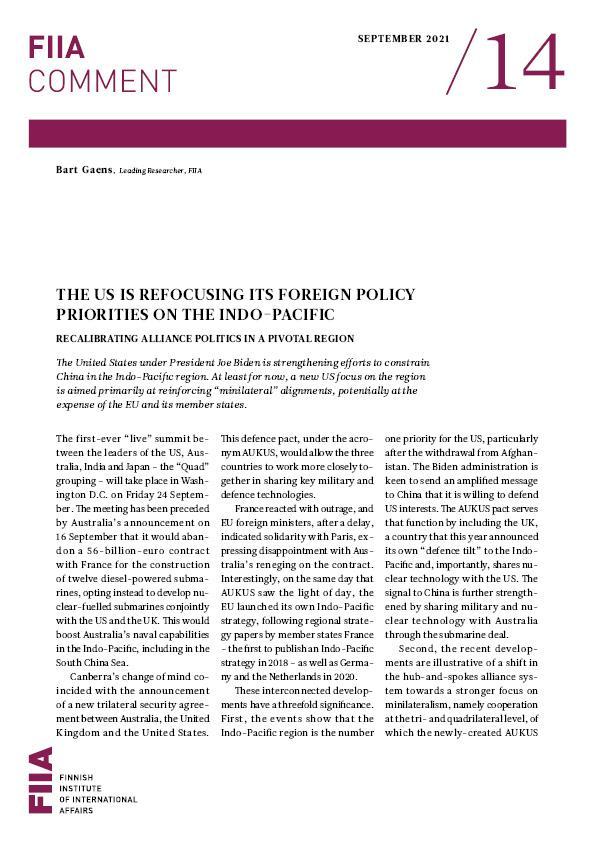
Guarantee-based alliances underpinned US grand strategy during the Cold War, but policies designed for the War on Drugs (WOD) after the 1990s, the Global War on Terror (GWOT) in the 2000s, and counter-piracy operations in the 2010s have led US policymakers to increasingly rely on ad hoc security partnerships.
Looser partnerships facilitate cooperation that is quick to reform and redistribute, benefiting the US when reacting to urgent risks. When the necessity for cooperation diminishes, partnerships allow for prompt “exit options”.
Guided by a narrowing set of strategic priorities under President Biden, the US partnership network is undergoing some downsizing. As part of a wider effort to challenge the US-led international order, Russia and China seek to reduce US opportunities to renew security partnerships.
Ever closer US and NATO partnerships with Finland and Sweden have bucked an otherwise weakening global trend in recent years. Russia’s escalated aggression in Ukraine has caused Finland and Sweden to seek policy change from partnership-based security policies to NATO membership and stronger deterrence.
Introduction
The US has long underpinned its global engagement with a combination of guarantee-based alliances and a network of looser security partnerships. Vital US alliances include the North Atlantic Treaty Organization (NATO) in the Euro-Atlantic area, multiple alliances in the Persian Gulf, a “hub and spokes” system in East Asia, and the Australia, New Zealand and US (ANZUS) Security Treaty. Each has long-term durability reinforced by a mutual defense guarantee. Conversely, security partnerships are more temporary or ad hoc, often struck to serve shorter-term capacity-building tasks and rarely involve strict mutual defense commitments. After some arduous expeditionary interventions over recent decades, many expect “strategic contraction” under President Joe Biden, whereby the US will reduce its foreign policy tasks and overseas military commitments.
This Briefing Paper analyzes global change in US security partnerships through themes including the evolution of US thinking on security partnering, the effect of geopolitical change on US partnerships, and the implications of Russia’s escalated aggression in Ukraine for the durability and development of US global security partnerships into the future. The paper argues that US partnerships are entering a challenging phase, with partners weighing the benefits of deeper US partnerships against the risks of provoking aggression by revisionist states. Yet the US is unlikely to pare back its international commitments to focus only on guarantee-based alliances; a downsized portfolio of looser security partnerships will still retain an important role in US grand strategy.
From alliances to partnerships
The US primarily managed its Cold War competition with the Soviet Union through a system of guarantee-based alliances focused on three key regions: Europe, the Persian Gulf, and East Asia. While the US needed to respond to a symmetric threat during the Cold War, the era of accelerated globalization that followed changed the strategic tempo, with Washington having to lead in managing a plethora of less predictable risks instead. More flexible, ad hoc partnering arrangements were thus viewed as vital for the US to effectively respond to this changed security environment. With the Global War on Terror (GWOT) and the concurrent War on Drugs (WOD) reaching their height after the 9/11 attacks, the 2006 US Quadrennial Defense Review (QDR) emphasized a shift “[f]rom static alliances – to dynamic partnerships”.[1]
Skeptical of NATO, the neoconservative policy staff serving under President George W. Bush often scorned the broad intra-alliance consensus required for multilateral military action for being too slow and politically problematic.[2] Looser partnerships were thus an alternative promising greater maneuverability with less institutionalized and more flexible cooperation. There was even some speculation that the US foreign policy future would be “without fixed, long-term alliances”, but where operations would instead be undertaken “in cooperation with a range of partners”.[3]
Flexible and ad hoc coalitions synchronized with Bush’s unilateralism. These allowed Washington to dispense with unwanted interference from allies, while keeping options open to receive assistance from partners, if required. Soon after 9/11, Secretary of Defense Donald Rumsfeld stressed a GWOT shaped by fluctuating partnerships: “There is no single coalition in this [counterterrorism] effort.” Operations would instead be undertaken by “a number of flexible coalitions that will change and evolve”.[4] US “coalitions of the willing” designed ad hoc for the GWOT, the WOD and counter-piracy operations were less committal, often temporary arrangements that either evolved or concluded after a spell.
Terrorism, piracy and illicit narcotics trading were all transnational problems prominent in Western security policy discussions in the 2000s. The US responded with attempts to forge partnerships with states as distinct as Russia and Djibouti. Tentative US-Russia counter-terrorism cooperation after 9/11 deteriorated quickly when fallouts occurred over the 2003 Iraq War and post-Soviet color revolutions in the 2000s. However, there was still some à la carte pragmatism after this when Russia tacitly facilitated the Northern Distribution Network (NDN), an important supply route enabling NATO-led stabilization in Afghanistan. In Djibouti, Camp Lemonnier was established by the US Navy in 2008 to support counter-piracy operations and supply-chain protection in the Gulf of Aden.
Pakistan became a vital state in US cooperation “remade” for the GWOT. Partnering with Islamabad, Washington received intelligence-sharing and over-flight rights for operations against Al-Qaeda and the Taliban in neighboring Afghanistan.[5] In return, Pakistan gained access to US weapons systems, joint training exercises, and professional military education — all of which were important as Islamabad battled internal militants while strengthening its response to tensions with India. The US also sought a wider “Central Asia footprint” with a temporary military base in Kyrgyzstan and counterterrorism partnerships with multiple Central Asian states. This enabled the GWOT coalition to lighten its presence in Afghanistan, softening the risk that an overly intrusive military presence could evoke a stronger backlash from local insurgents.
After the Bali bombings in October 2002, terrorism and violent insecurity stemming from weak state capacity in Southeast Asia were discussed as the GWOT’s “second front”, leading the US to upgrade its security cooperation in the wider region. In parallel with its Mutual Defense Treaty (MDT) with the Philippines, the US established an additional ad hoc partnership, deploying Special Operations Forces (SOF) to cooperate with local authorities and to eventually improve Manila’s capacity to confront Islamic militants. In Latin America, Washington utilized similar ad hoc partnering for the WOD. For example, to limit narcotics flows at source, the US supported Colombia with resources for military, police and law-enforcement capacity-building.
Looser arrangements
Ad hoc partnering has extended beyond intergovernmental limits. When stabilization was the main priority for the US after intervening in Afghanistan and Iraq, it gained military and civilian assets to support its priorities from partnerships with “big tent” international organizations, NGOs, and private contractors. NATO was even perceived less as a guarantee-based alliance and more as a flexible “pool of military power that can operate with [its] own [US forces] in coalition”.[6] Ad hoc cooperation was particularly important in Syria when President Barack Obama ruled out intervention with conventional US ground forces. His administration still emphasized assistance for US-aligned Syrian factions to “defend themselves”, supplying the Syrian Democratic Forces (SDF) fighting both Bashar al-Assad’s regime and the Islamic State (IS) with military training, weapons and air support.[7]
The US troop “surge” in Afghanistan between 2009 and 2011 did not deliver stabilization. The International Security Assistance Force (ISAF) was eventually downsized to Operation Resolute Support (ORS) in 2014. The US then further reduced its commitments, narrowing its focus to support local capacity for an eventual transfer of full public order responsibilities to the Afghan National Security Forces (ANSF). The termination of this increasingly skeletal US-Afghanistan partnership under Biden in August 2021 highlights the strong risk aversion that now shapes US thinking on overseas military commitments: unless vital US strategic interests are perceived to be at stake, Washington will not hesitate to withdraw using the quick “exit options” available when ad hoc partnering. Biden no longer viewed Afghanistan as a base for terrorism that could seriously harm US interests. After this, there was little in the US-Afghanistan partnership for Kabul to leverage to persuade Washington to continue providing support.
Partnerships allow the US to quickly reform and redistribute its security cooperation. This is an advantage when managing global upheaval. However, some partnerships have also proved costly for the US. Unlike ad hoc partnerships, with a longer-term focus, guarantee-based alliances have enduring benefits. The US is usually the main producer of these benefits, and power asymmetry enables Washington to marshal allies in line with its priorities. For example, the turbulent US-Saudi Arabia alliance endures because Riyadh continues to value “static” US defense guarantees and therefore stops short of acquiring nuclear weapons, a move likely to risk Washington’s exit from the alliance. Promising fewer “static” benefits, ad hoc partnerships are more precarious, which often reduces US leverage to influence deviant partners.
US-Pakistan relations over the past decade provide a telling example of the latter pattern. The US was long dependent on Pakistan to support its stabilization priorities in Afghanistan. After US military operations began in Afghanistan in late 2001, Pakistan duplicitously exploited this dependence: its Inter-Services Intelligence (ISI) assisted the US and NATO, but some ISI elements also collaborated with the Taliban. Benefits received from US and NATO partnerships were not enough to override Pakistan’s objectives to support militant factions in Afghanistan, even if Washington’s stabilization interests were undermined. Threatened by India’s larger conventional military, Pakistan’s leaders often explore possibilities to weaponize Taliban militants as an irregular response to New Delhi. Professor Mohammed Ayoob argues that duplicity in its US policy has paid Pakistan “good dividends” as its connections to the Taliban make it a “primary power broker” shaping Afghanistan’s future.[8]
Pakistan’s actions show that ad hoc cooperation can allow the weaker side to exploit a stronger power to its advantage if that power is “entrapped”, needing cooperation to continue. The breakdown in US-Pakistan relations reduces Washington’s indirect influence to prevent draconian Taliban policies in Afghanistan. When the US military withdrew in 2021, Biden signaled that if the Taliban was to again harbor global terrorist elements on Afghan territory, the US could respond with military units stationed in proximate regions, but changing geopolitics will limit America’s ability to do this. US partnerships in wider Central Asia established for the GWOT under Bush have long faded. Renewing US influence in this region will draw an antagonistic riposte from both China and Russia, as Moscow exerts military dominance and Beijing prioritizes access to the region’s national resources.
Dangerous halfway houses?
Amid rising great-power tensions, it is increasingly difficult for the US to convey that its security partnerships are solely designed to support defensive aims. With US efforts to strengthen security cooperation likely to face obstruction, without a guarantee to signal clear deterrence, cooperation through partnerships can risk a dangerous “halfway house” for states vulnerable to aggression from revisionist powers. This problem was identified in May 2022 when Finland and Sweden applied for NATO membership and the US and the UK provided bilateral security assurances to cover both states until membership is ratified.
Nevertheless, in other situations, partnering with the US can still leave a state vulnerable to increased aggression, but without firm US security guarantees or assurances to ultimately deter this. Under invitation from Kyiv, the US-Ukraine security partnership only developed slowly after Russia’s illegal annexation of Crimea in 2014. Obama was cautious about offering US military support, but cooperation did improve incrementally.[9] In 2020, Ukraine became a NATO Enhanced Opportunities Partner (EOP), giving Kyiv some “tailor-made” benefits including “enhanced access to interoperability programs and exercises, and more sharing of information”.[10]
These partnerships were important for Ukraine’s defense capacity but still modest. Nevertheless, throughout its invasion of Ukraine in 2022, Russian disinformation has distorted the nature of this support. Assistance through Western partnerships is an important component in the modernization of Ukraine’s defense, but it is fictional to claim – as Russian President Vladimir Putin has – that this support is aggressively instrumentalized. While Western partnerships assist Ukraine’s capacity to frustrate Russian attacks, some problems are also visible. This support contributed to a Ukrainian posture that could inflict some serious military punishments on Russia for its encroachments, but it did not deter a full-scale invasion. This experience has led US and NATO partners elsewhere to rethink these arrangements in terms of deterrence strength.
Finland’s and Sweden’s partnerships with the US and NATO strengthened defense capacity in Northern Europe through military exercises, intelligence-sharing, improved access to advanced military technologies, and closer cooperation in regional defense coordination. Military interoperability and sensitive intelligence-sharing indicate that Finland’s and Sweden’s relations with NATO function with strong mutual trust, bringing all parties into full alignment if not alliance.[11] Before applying for NATO membership, Sweden and Finland relied on multiple partnerships (bilateral, with NATO, in the EU, and in NORDEFCO) to support a stronger independent defense capacity to signal high costs to Russia if it were to attack. However, events in Ukraine led Helsinki and Stockholm to doubt whether a posture without collective defense guarantees was enough for security when Russia had launched an expansive assault on a nearby neighbor. Collective guarantees under NATO’s Article 5 provide the stronger deterrence required to respond to a regressive security situation.
Shifting alignments
Obama responded to global power redistributions with a “rebalance” strategy, refocusing US assets on East Asia while downsizing some military commitments in the Middle East and Europe. President Donald Trump’s strategic priorities were less coherent; he regularly chastised NATO while exerting pressure on China, especially in trade policy. Biden seeks to reduce some US commitments overseas, emphasizing more resources for domestic priorities. Strengthening long-standing guarantee-based alliances is a primary priority for the US to manage a new era of great-power competition, but some partnerships will also remain important. Biden’s task is no longer as straightforward as “rebalancing” support for its bilaterally-driven “hub and spokes” alliance system mainly focused on Japan, Taiwan and South Korea. The US must now balance its response to the rising influence of China with support for stronger deterrence against Russia in Europe. Washington will expect more equitable burden-sharing from its allies and partners in meeting these objectives.
Having its own bitter tensions with China, India has tacitly deepened its US partnership. Trump had cordial relations with Indian Prime Minister Narendra Modi, with some military-to-military ties being improved. India recently completed several military procurements from US manufacturers, but it is still dubious whether this cooperation is a first step towards a serious realignment. Before recent US procurements, New Delhi long favored the Soviet Union, later Russia, as its main foreign military equipment supplier. Despite warm US-India relations under Trump, some serious roadblocks continue to hinder this partnership. When India purchased the Russian-supplied S-400 air-defense system, with the first deliveries in late 2021, Washington threatened sanctions against New Delhi. Further tensions emerged when India did not join Western condemnation of Russia’s escalated aggression in Ukraine, as it soon emerged as an alternative market for Russian oil, softening the economic blow on Moscow from Western sanctions.
With multiple border skirmishes occurring between China and India since 2020, if China escalates this aggression, New Delhi is unlikely to see its current US partnership as creating additional deterrence. US-India relations further highlight the disadvantage in ad hoc partnering that once short-term benefits have been reaped, little remains to influence later decisions unless the partnership is updated. After its fallout with Washington, Pakistan has strengthened ties with both Russia and China. Islamabad and Beijing share a tense rivalry with India, while Pakistan is an important emerging market for Russian natural gas exports.[12] Stronger military-to-military ties are likely to later accompany these economic transactions. The US has been the strongest external influence on security in South Asia for the past 20 years, but this region’s future is now in the hands of a cacophony of competing powers, with further instability thus lying in store.
Reverberations from Ukraine in wider Asia
Multiple global repercussions have reverberated from Russia’s war in Ukraine. If China perceives Western support for Ukraine as ineffective, this could trigger escalated military aggression in the Indo-Pacific. However, Western actors have supported Ukraine with considerable economic and military assistance that has helped to frustrate Russia’s aims. If this resolve continues, it can deter aggression elsewhere, creating a perception for competitors that Western actors will enforce costly punishments when the rules-based order is violated. There is concern that Taiwan is a primary target for Chinese aggression, but contrary to the ad hoc US-Ukraine partnership, Taiwan has an alliance with the US. The Taiwan Relations Act (1979) has fewer public commitments and more caveats compared to US alliances with Japan or South Korea, but it does not rule out the US directly coming to Taiwan’s defense under certain circumstances. This provides Taiwan with an added layer of deterrence against China that was unavailable to Ukraine against Russia.
Outside the main US alliances in East Asia – Japan, South Korea and Taiwan – a large proportion of Washington’s posture in the wider region is maintained through partnerships. US partners Indonesia, Malaysia, and Singapore are likely to see a mixed picture emerging from Ukraine. While Kyiv’s partnerships with the US and NATO did not deter aggression, the transfer of Western weapons systems and military training have contributed to an effective Ukrainian resistance. This leaves China to perceive that military coercion or conquest over any neighboring military supplied or trained in partnership with the US will be no easy task. As the Indo-Pacific grows in strategic importance, states within the Association of Southeast Asian Nations (ASEAN) preferring a “balance of influences” between the US, the EU, China and Japan will likely experience more geopolitical alignment pressures.
Some dilemmas expressed in recent debates in neighboring Australia also resonate with some ASEAN members, most pertinently as to whether stronger military ties with Washington are necessary in response to rising tensions, or whether continued ambivalence will benefit regional stability and trade with China. The trilateral AUKUS partnership for improved naval, cyber, and artificial intelligence (AI) collaboration in 2021 ultimately unveiled Australia’s preference for deeper defense cooperation with the US and the UK in addition to the ANZUS Treaty. With most ASEAN states having less maneuverability for stronger US security cooperation, it remains an open proposition as to whether some ASEAN members with closer US relations, such as Indonesia, Malaysia, and Singapore, will gradually edge towards deeper US partnerships, or whether this option will be rejected out of concern that even incremental cooperation might provoke Chinese aggression.
Conclusions
This paper examined change in US security partnership policy, arguing that such cooperation is entering a challenging phase. “Strategic contraction” for Biden is unlikely to simply involve the US paring back its international commitments to focus only on guarantee-based alliances. Washington will still build cooperation through looser security partnerships, even if this portfolio undergoes some downsizing. Military assistance for Ukraine through ad hoc US and NATO partnerships is a crucial Western policy response to Russian aggression. Despite this, a broader outlook shows that some once-crucial US partnerships are concluding for different reasons.
Russian aggression has caused Sweden and Finland to apply for NATO membership, creating stronger deterrence benefits than previous partnerships. Viewed in isolation, this is positive news for the US. However, this re-evaluation in Helsinki and Stockholm might further prompt states elsewhere to see less deterrence value in their US partnerships, but without having an option to “upgrade” to full alliance status. A breakdown in the US-Pakistan partnership and discord in relations with India reduce US influence in South Asia. A mixed picture is also developing in the Asia-Pacific. Washington is strengthening its long-term “hub and spokes” alliance system. However, elsewhere, an ever more delicate “balance of influences” is causing ASEAN states to cautiously calculate wider alignment risks, epitomizing the rising geopolitical pressure likely to obstruct the renewal of US security partnerships in a new era of great-power competition.
Endnotes
[1] US Department of Defense, Quadrennial Defense Review Report, Washington DC, 6 February, 2006, p. vii, https://www.hsdl.org/?view&did=459870.
[2] Bruno Tertrais, “The changing nature of military alliances,” The Washington Quarterly, 27 (2) (2004), p. 141.
[3] Rajan Menon, “The end of alliances,” World Policy Journal, 20 (2) (2003), pp. 5-16.
[4] Donald Rumsfeld quoted in The Washington Post, “The coalition and the mission,” 21 October, 2001, https://www.washingtonpost.com/archive/opinions/2001/10/21/the-coalition-and-the-mission/e7de7bdf-c826-4c80-a578-283750026c72/?utm_term=.cca0f394c023.
[5] Daniel Byman, “Remaking alliances for the War on Terrorism,” Journal of Strategic Studies, 29 (5) (2006), pp. 770-771.
[6] Sten Rynning, “Coalitions, institutions and big tents: the new strategic reality of armed intervention,” International Affairs, 89 (1) (2013), pp. 53-68. And Thomas S. Mowle and David H. Sacko, “Global NATO: bandwagoning in a unipolar world,” Contemporary Security Policy, 28 (3) (2007), pp. 597-598.
[7] Robert M. Gates, “Helping others defend themselves: the future of US security assistance,” Foreign Affairs 89 (3) (2010), pp. 2-6.
[8] Mohammed Ayoob, “The Taliban and the changing nature of Pashtun nationalism,” The National Interest, 10 January, 2019, https://nationalinterest.org/feature/taliban-and-changing-nature-pashtun-nationalism-41182.
[9] Conor Gallagher, “NATO programme has been massively beneficial for Ireland and Ukraine, says Defence Forces officer,” The Irish Times, 26 June, 2022, https://www.irishtimes.com/ireland/2022/06/26/nato-programme-has-been-massively-beneficial-for-ireland-and-ukraine-says-defence-forces-officer/.
[10] “NATO recognises Ukraine as Enhanced Opportunities Partner,” Brussels: North Atlantic Treaty Organization (NATO), 12 June, 2020, https://www.nato.int/cps/en/natohq/news_176327.htm.
[11] Matti Pesu, “As Finland watches: from alignment to alliance?,” War on the Rocks, 11 February, 2022, https://warontherocks.com/2022/02/as-finland-watches-from-alignment-to-alliance/.
[12] “Factbox: Pakistan-Russia collaboration on gas pipeline project,” Reuters, 23 February, 2022, https://www.reuters.com/business/energy/pakistan-russia-collaboration-gas-pipeline-project-2022-02-23/.










